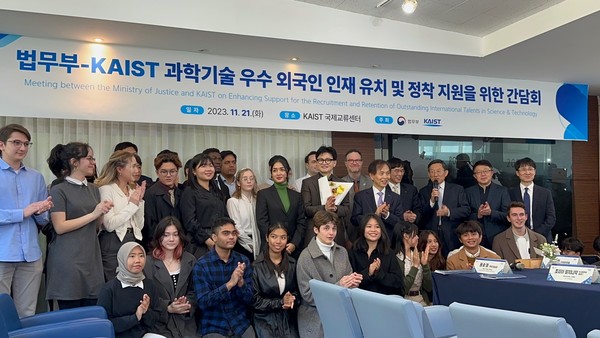South Korean Justice Minister Han Dong Hoon met with KAIST international students, researchers, and faculty on November 21 at the KAIST International Center (W2-1) Lounge. The event, officially called the “Meeting between the Ministry of Justice and KAIST on Enhancing Support for the Recruitment and Retention of Outstanding International Talents in Science & Technology,” was also joined by KAIST President Kwang Hyung Lee, Senior Vice President for Planning and Budget Gyun Min Lee, International Office Vice President Man-Sung Yim, International Office Associate Vice President Shuping Xiong, and other officials from KAIST and the Ministry of Justice.

According to the Ministry of Justice, this meeting was held to listen to the difficulties foreign students and researchers face so that the ministry can reflect these concerns in improving immigration and visa policies. The ultimate goal is to allow international talents to stay and conduct research activities in Korea comfortably.
Minister Han delivered an opening speech facing the invited international students. He emphasized, "We do not consider you as targets of foreign or immigration policy. We think of outstanding scientific and technological talents like you as partners who will lead the science and technology of the Republic of Korea together. Without you, there will be no scientific and technological development in Korea."
Minister Han then asked the international students for a favor, “I hope that you will continue to conduct research in Korea until you are in your 60s or 70s. Please contribute to developing our science and technology so that those in their 20s and 30s can also reach their 60s and 70s.”
In addition, he said, “Korea's visa policy is a necessary measure for national order and safety, but I think you are uncomfortable with the current policies. Thus, the Korean government will provide clear preferential treatment to outstanding talents in science and technology like you. I will make it happen.”
Lastly, he claimed, “As long as talented individuals like you want to research, study, and work in Korea, we will make sure they don’t have to worry about visas,” and added, “I don’t think the visa policy amendment is something worth putting off as a mid-to-long-term task. We will formalize and announce the plan within December.”
The international students and researchers in the meeting then raised concerns to Minister Han including the strict guidelines for the new F-2-7S visa, the lack of job opportunities for family members, the uncertain future of the in-campus Global Visa Center, and the visa difficulties when applying for leave of absence.
Minister Han promised to ease all of these concerns. In particular, he vowed to adjust restricting timelines in the eligibility for the F-2-7S visa. The F-2-7S visa is offered in line with the new fast-track system for the permanent residency and naturalization of global talents implemented on January 2.
While the existing permanent residency and nationality acquisition process is complex and involves four to five steps, the fast track system consists of a three-step process, greatly reducing the time required from six years to three years, only for those who have earned their master's or doctoral degrees from five science and technology institutes including KAIST, DGIST, GIST, UNIST, and UST. Graduate students from these universities can get an F-2 residency visa immediately after graduation by obtaining a letter of recommendation from the university president. After they continue their research activities in Korea for three more years, they can acquire the F-5 permanent residency visa. Moreover, those who can produce outstanding research outcomes can be eligible to be granted Korean nationality.
Responding to the other issues, Minister Han also pledged to expand job opportunities for the family members of science and technology talents, maintain and expand the services offered by the Global Visa Center, and ease the visa reapplication requirements after taking a leave of absence.
Additionally, the ministry plans to provide incentives through the visa system to foreigners who respect law and order, while taking strict action against illegal immigrants. Minister Han also mentioned that he will push for the establishment of the Immigration Management Office to achieve balanced immigration policies that can attract excellent overseas talent and expand the skilled workforce.

